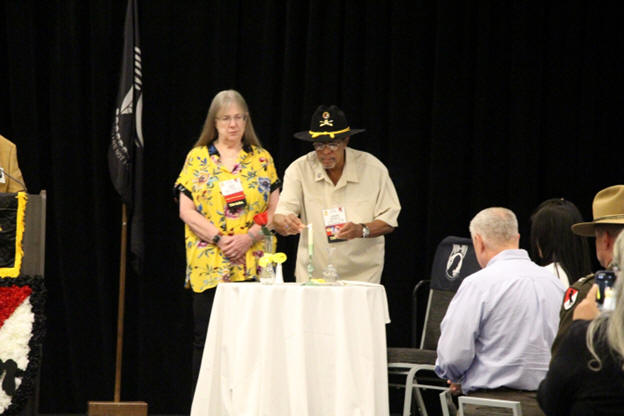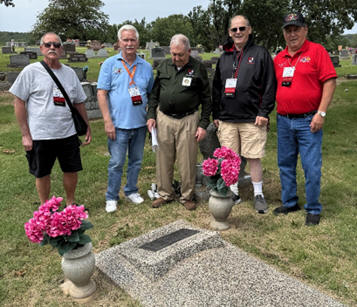
Chaplain Bill Karabinos
HHT 2/11, 1971-1972

Chaplain’s Corner
|
|
Chaplain Bill Karabinos
|
|
Chaplain's Corner
Disturbing
Recording and recognizing the names of the 740 former Blackhorse Troopers of
Vietnam and Cambodia that we honored at our reunion; whose death we only learned
of this past year, disturbed me. Especially one of the last to pass with tickets
to Tulsa in his pocket, my dear friend and fellow trooper; indeed, my body guard
in the Nam - the irrepressible John Hrom. John had been my dear friend ever
since, for 54 years now. His death startled and disturbed me.
That personal disturbance at our reunion, where we were able to only read 330 of
those names due to time restraints, was mitigated and consoled by the
fraternity, the outpouring of strength and love for our Blackhorse veterans and
their families, by our own loving community. So much so that I looked instead at
my personal disturbance as a hopeful thought; an opportunity to expand in an
unselfish way, our care for one another. We did honor the other 410 names by
printing them on the honor rolls and placing a page to honor each one, in our
five Bunker books.
Sir Francis Drake, Privateer, Navigator and principal depositor of Spanish gold
to the “Bank of England,” actually wrote a prayerful and startling poem-prayer
in the 16th century. It reads …
Disturb us, Lord, when
We are too well pleased with ourselves,
When our dreams have come true
Because we have dreamed too little,
When we arrived safely
Because we sailed too close to the shore.
Disturb us, Lord, when
With the abundance of things we possess
We have lost our thirst
For the waters of life;
Having fallen in love with life,
We have ceased to dream of eternity
And in our efforts to build a new earth,
We have allowed our vision
Of the new Heaven to dim.
Disturb us, Lord, to dare more boldly,
To venture on wider seas
Where storms will show your mastery;
Where losing sight of land,
We shall find the stars.
We ask You to push back
The horizons of our hopes;
And to push into the future
In strength, courage, hope, and love.
And so, our disturbance should point to hope. A hope that at our Tulsa reunion
was caressed by our Blackhorse brothers and sisters who we were able to see
again, and by new faces, new friends that we made, new smiles that we witnessed
from our regulars and ‘first timers’ at our reunion.
It is quite enlightening when you think of it; we talk more about our friends,
and the friends that we knew at those gatherings, than about the aches and pains
we suffer or the woes of the world around us. We enjoy our friends, and we are
careful not to offend them: we want to keep them close. Besides keeping them
close, we enjoy adding new friends to our memory bank. We enjoy seeing that bank
account grow and we grieve when it dwindles.
If we can joyously count a good number of friends, we are comfortable. If we
only have a few, or none at all … we are disturbed. I always relish the wisdom
of my friends who years ago, in my youth, taught me that simple maxim: if you
want to have a friend, you have to be a friend. Stay in touch, make a call, send
a note or a text. Send a card – or flowers, or a picture.
Yes, again I’ll say: if you want to have a friend, you have to be a friend. We
are consoled by their support and courage; the love of a friend is our only hope
of finding bliss – of being undisturbed. In that love, flowing to and from our
friend, we find the courage, we find hope - we find happiness.
For a great many of you, probably all of you who have attended a reunion, just
think of that feeling of happiness you experienced when you entered the Bob
Moreno registration room at our reunions. That greeting – present year after
year, always punctuated with smiles in a chamber of “jollification” - ever and
excitingly welcomes you home.

Ed and
Denise Brown (A Trp, 67/68) light the candle at the Missing Man Table,
Tulsa Reunion Banquet. (Photo: Jennifer Quinn)
Chaplain Blandin “Bill” Karabinos
-------------------------------------------------------------------------------------------------------------------------------------------------------------------------------
Remembering Our Fallen
Brothers…
(Editors Note: This article is combined input from Chp. Bill Karabinos and VP
Allen Hathaway)
Friday afternoon at the Tulsa Reunion (9/5/2025), a few Blackhorse veterans
gathered in the hotel lobby to leave on a mission. A mission to find, clean and
re-consecrate the grave of one of our brothers killed in action (KIA) in
Vietnam. The mission has recently become one of the unique ways we honor our
fallen at our annual reunions. This Operation Embrace was kick-started as a
“personal thing” by President Emeritus Allen Hathaway, who also handles, with
precision and loving care, KIA issues for the veterans of the 11th ACR of
Vietnam and Cambodia.
A few years back, the chaplain joined Allen to visit a KIA grave in Birmingham,
only to discover a neglected cemetery, overgrown with weeds surrounding dead
trees that looked like a Hollywood version of Boot Hill. Searching through the
pot-holed gravel driveways in a hopeless cause, a monument company was
discovered on the other side of a rusted cycle fence. Fortunately, the people at
the company’s office had a plot of the graves and a willingness to help locate
the grave of our KIA who was buried in that cemetery. Following the two veterans
back to the cemetery with weed-whackers in hand, they cleared a 100 square feet
area, to no avail. Reexamining the plot map, they then moved to a different
location and were able to locate the headstone. That stone had sunk deep into
the soggy turf, but it was pulled up by Allen and the Chaplain, cleaned and
repositioned in its proper place. After cleaning the stone, and praying over the
grave, it was comforting to know that at least this veteran trooper, was honored
– yet 50 years from the time of his death, by his brothers.
Since then, the graves located have not been in such deplorable conditions, and
yet, they still have been hard to find. Once found, they are cleaned and shined
a little; the grass is trimmed around the headstone, a moment of silent
reflection is observed and after a few short prayers, a memento of our visit is
left behind, and a solemn salute is offered in the best tradition of the
soldiers of the United States Armed Forces.
In Tulsa, a reunion pin was placed on the stone and an 11th Cav calling card
left in the flower urn. If nothing else, we will leave two dimes and a penny,
sort of a 21-gun salute, the highest honor the nation can pay its honored dead.
Above, it was noted that Allen Hathaway, Director of Operation Embrace,
mentioned that these visits are a “personal thing.” So much so, that for him,
and usually accompanied by his illustrious wife, Pam, 191 graves of our fallen
have been visited. Allen and Pam, actually visited, cleaned and brushed 10 sites
in the state of Oklahoma. In Oklahoma cemeteries, the 11th Cav has 14 grave
sites in 14 different locations, only four of which are within 25 miles of
Tulsa. The others are scattered across the state, so much that Pam and Allen
visited 10 graves positioned from 25 to a hundred miles apart. Why, such a
passion? As Allen humbly notes: “I…we have so many things to be thankful for.
The lives of those 730 KIA’s were cut short. Most were 18/21 years old when they
died. I thank them every day for their sacrifice and that of their family.”
So, this year, Allen was joined by 5 other troopers: Bill Hadfield (B Trp),
Robert Jensen (K Trp), Bob Malewski (HHT 1), Eric Spanier (L Trp) and Chaplain
Bill to pay respects to Chester Roy Reese, SP5 of C Troop, who was killed in
action on September 5, 1970. This was the 55th anniversary of his death. Chester
was laid to rest in the Woodlawn Park Cemetery, a well-cared for municipal
cemetery but 10 miles from Tulsa and the reunion hotel, in Sand Springs,
Oklahoma. It took all of us about 10 minutes to search the large plot until we
found the headstone, satisfied that it was well cared for and respected.
As we gathered to reflect and say a prayer, it seemed that a certain warm
indefinable current passed between us, the veterans who with heads cast down
silently struck hands and passed our own thoughts to that lad who had traveled
55 years ago that day to Fiddler’s Green. "
Note: The graves visited to date, along with their picture are posted at the
following link:
https:// 11thcavnam.com/womenscorner/KIA_A_L. htm
On Friday afternoon of the 2025 reunion, Chaplain Bill along with 4 other
troopers visited the grave site of Chester Roy Reese who died on Sep. 5, 1970,
while serving with C Troop, 1/11 ACR. The visit was 55 years to the day of when
he passed away. Chester is laid to rest in Woodland Memorial Park Cemetery in
Sand Springs, OK, located about 10 miles from the reunion hotel in Tulsa.
During our visit we cleaned his marker and Chaplain Bill said a prayer over his
grave. A small reunion pin was left at his grave. Those attending in addition to
Chaplain Bill were Robert (Bob) Malewski (HHT 1/11), Robert Jensen (K Trp 3/11),
William (Bill) Hadfield Jr (B Trp 1/11), Eric Spanier (L Trp 311) and Allen
Hathaway (HHT Regt).
Specialist 5 Chester Roy Reese served in C Troop, 1st Squadron, 11th Armored
Cavalry Regiment. He died of wounds received when a mine detonated while he was
commanding a Sheridan. He was transferred to United States Army Hospital Camp
Zama, Japan, where he died on 5 Sep 1970 as a result of wounds received on 23
Aug 1970.
Chester was a recipient of Bronze Star Medal, Purple Heart Medal, Army
Commendation Medal, National Defense Service Medal, Vietnam Service Medal,
Republic of Vietnam Campaign Medal and the Combat Infantryman Badge.
Earlier in the week, we visited 10 other cemeteries in Oklahoma to pay our
respects to our fallen.
ROBERT KNAPP HENDERSON JR, A Trp 1/11, KIA 19 Jun 1970, Oklahoma City, OK
LARRY GENE MORGAN, HHT 11TH ACR, KIA 8 May 1970, Norman, OK
BILLY GENE RODGERS, K Trp 3/11, KIA 21 Jul 1967, Chickasha, OK
MARVIN L NOE, I Trp 3/11, KIA 9 May 1969, Fort Sill, OK
DOUGLAS WAYNE HILL, HHT 3/11, KIA 21 Jul 1967, Lawton, OK
HERBERT SPENCER BARNES, F Trp 2/11, KIA 19 May 1971, Bixby, OK
DONALD LEE RANKINS, L Trp 3/11, KIA 12 Jun 1968, Wagoner, OK
GARY JOHN DASHER, A Trp 1/11, KIA 13 Apr 1969, Skiatook, OK
VIRGIL CARLYLE COMBS, L Trp 3/11, KIA 18 Feb 1969, Dewey, OK
Billy Rodgers and Douglas Hill were killed on the same day, 21 July 1967, in the
same incident.
In the past few years we have tried to visit the cemeteries of our KIA's, some
of which are near our reunions. The visits are part of a project to visit and
pay our respects to our fallen. With the 10 during the reunion, we have visited
a total of 191 of our fallen.


L to R: Bill
Hadfield, B Trp, 69-70, Kirkwood, NJ; VP Allen Hathaway, Regt HHT, 66-67,
Manassas, VA,
Chp. Bill Karabinos, HHT, 2/11, 71-72, Toano, VA; Bob Jensen, K Trp, 3/11,
68-69, Minneapolis, MN;
Bob Malewski, HHT, 1/1, 69, Wrightstown, WI